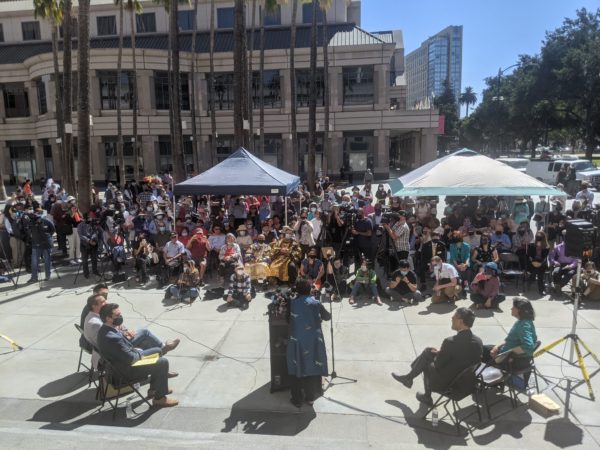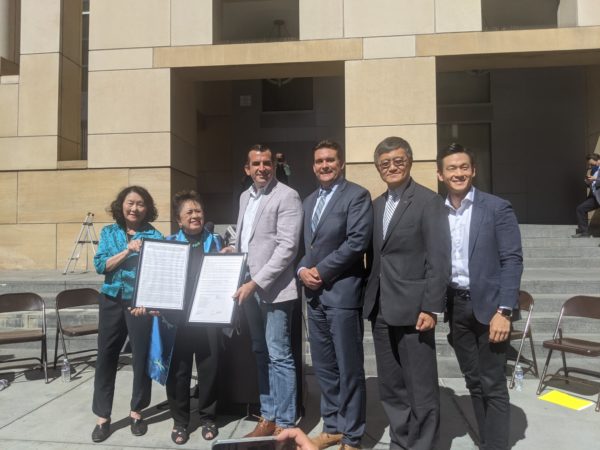Although I’ve lived in the San Francisco Bay Area since 1999, I did not know much about the history of Chinese Americans in the area beyond the Chinese Exclusion Act. I was surprised to hear that back in May, that the city of Antioch apologized for its past actions against the Chinese:
“A California city has apologized for its treatment of Chinese immigrants who came to the city during the state’s gold rush, atoning for its past as a “sundown town” where the Chinese were barred from the streets after dark.
During a special meeting this week, the Antioch City Council unanimously adopted the resolution to issue a formal apology to early Chinese immigrants.
At the news conference, on April 14 at Waldie Plaza, the site of a former Chinatown that was burned by a mob in 1876, Mr. Thorpe signed a proclamation condemning hate against Asians and Pacific Islanders.”
Last week, I was also surprised to learn what happened to the Chinese and Chinatown in San Jose in 1887, now the 10th largest city in the U.S.:
“San Jose, with a population over 1 million, is the largest city in the country to formally apologize to the Chinese community for its treatment of their ancestors. … California, too, apologized in 2009 to Chinese workers and Congress has apologized for the Chinese Exclusion Act, which was approved in 1882 and made Chinese residents the targets of the nation’s first law limiting immigration based on race or nationality
The city had five Chinatowns but the largest one was built in 1872. Fifteen years later, the city council declared it a public nuisance and unanimously approved an order to remove it to make way for a new City Hall. Before officials acted, the thriving Chinatown was burned down by arsonists, destroying hundreds of homes and businesses and displacing about 1,400 people, according to the resolution.
…
The Chinese started coming to California in large numbers during the Gold Rush in the mid-1800s. They worked in mines, built the transcontinental railroad, toiled in farms and helped develop the abalone and shrimp industries. By 1870, there were about 63,000 Chinese in the United States, 77% of them residing in California, according to the resolution.Chinese immigrants faced racism and were forced out of towns. They were denied the right to own property, marry white people and attend public schools. They also were subjected to violence and intimidation and denied equal protection by the courts.
In San Jose, an episcopal church where Chinese immigrants attended Sunday school was burned to the ground, Chinese laundries were condemned based on being housed in wooden buildings and the first state convention of the Anti-Chinese League was held there in 1886, according to the resolution.”
And the last remains of a Chinatown in San Jose were destroyed back in 1949:
“In 1949, the city demolished the Ng Shing Gung Temple, the last vestige of the city’s Heinlenville Chinatown, over the objections of historians and Chinese American residents. The Chinese Historical and Cultural Project built a replica of the temple, with exhibits about Chinese American history in the Santa Clara Valley, and gave it to the city in 1991 as a token of friendship and forgiveness.”
The resolution passed Tuesday evening, with a one hour public event on Wednesday, which I was able to attend. I wasn’t surprised by the turnout, given that San Jose is over 30+% Asian, with a lot of Chinese and Chinese Americans living in the area.
The speakers at the event were:
- Councilmember Raul Peralez, District 3, San Jose
- Mayor Sam Liccardo, City of San Jose
- Connie Young Yu, a historian and author of “Chinatown, San Jose, USA,” and descendant of residents of the Market and San Fernando Street Chinatown
- Gerrye Wong, co-founder, Chinese Historical and Cultural Project (CHCP)
- Otto Lee, County of Santa Clara Board Supervisor
- Evan Low, California State Assemblymember
with Mayor Liccardo reading the resolution (PDF) – the first time he’s ever read a resolution in full in public (they are usually very long …)
Courtesy of 8Asians. From left to right: Connie Young Yu, Gerrye Wong, Sam Liccardo, Raul Peralez, Otto Lee, and Evan Low.
The resolution’s conclusion:
NOW, THEREFORE, BE IT RESOLVED THAT THE COUNCIL OF THE CITY OF SAN JOSE:
-
Apologizes to all Chinese immigrants and their descendants who came to San José and were the victims of systemic and institutional racism, xenophobia, and discrimination;
-
Acknowledges acts of fundamental injustice, terror, cruelty, and brutality, including the dismantling and destruction of the city’s Chinatowns;
-
Recognizes the contributions and resilience of the Chinese community and their commitment to fostering reconciliation and friendship; and
-
Resolves to rectify the lingering consequences of the discriminatory policies of the City of San José, and to use this resolution as a teaching moment for the public to move forward towards justice for all.
The event concluded with a traditional dragon and lion dance.










